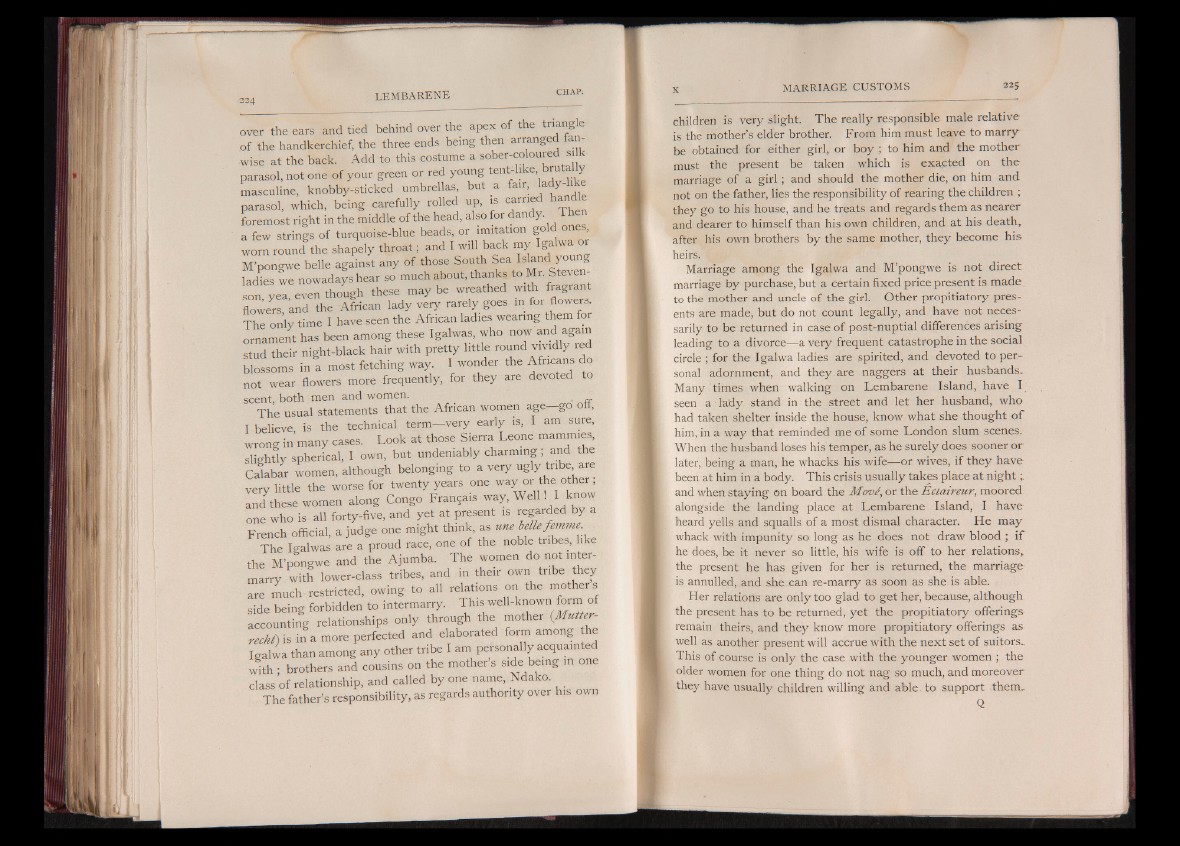
over the ears and tied behind over the apex of the triangle
of the handkerchief, the three ends being then arranged fan-
wise at the back. Add to this costume a sober-coloured si
parasol, not one of your green or red young tent-like, ru a y
masculine, knobby-sticked umbrellas, but a fair, lady-
parasol, which, being carefully rolled up, is carried han
foremost right in the middle of the head, also for dandy. 1 he
a few strings of turquoise-blue beads, or imitation go ones,
worn round the shapely throat ; and I will back my ga wa
M’pongwe belle against any of those South Sea Islan y
ladies ™ nowadays hear so much about, thanks to Mr Stevenson
yea, even though these may be wreathed with fragrant
flowers and the African lady very rarely goes m for flowers.
The only time I have seen the African ladies wearing them for
ornament has been among these Igalwas, who now and again
stud their night-black hair with pretty little round vividly red
blossoms in a most fetching way. I wonder the Africans do
not wear flowers more frequently, for they are devoted to
scent, both men and women. , gj
The usual statements that the African women age— go oti,
I believe is the technical term— very early is, I am sure,
wrong in many cases. Look at those Sierra Leone mammies,
slightly spherical, I own, but undeniably charming ; and the
Calabar women, although belonging to a very ugly tribe are
very little the worse for twenty years one way or the other,
and these women along Congo Français way, Well ! 1 know
one who is all forty-five, and yet at present is regarded by a
French official, a judge one might think, as u n e belle femme
The Igalwas are a proud race, one of the noble tribes, like
the M’pongwe and the Ajumba. The women do not intermarry
with lower-class tribes, and in their own tribe they
are much restricted, owing to all relations on the mothers
side being forbidden to intermarry. This well-known form of
accounting relationships only through the mother \Mutter-
rechi) is in a more perfected and elaborated form among he
Igalwa than among any other tribe I am personally acquainted
with ; brothers and cousins on the mothers side being in one
class of relationship, and called by one name,.Ndako.
The father’s responsibility, as regards authority over is own
children is very slight. The really responsible male relative
is the mother’s elder brother. From him must leave to marry
be obtained for either girl, or boy ; to him and the mother
must the present be taken which is exapted on the
marriage of a girl ; and should the mother die, on him and
not on the father, lies the responsibility of rearing the children ;
they go to his house, and he treats and regards them as nearer
and dearer to himself than his own children, and at his death,
after his own brothers by the same mother, they become his
heirs.
Marriage among the Igalwa and M’pongwe is not direct
marriage by purchase, but a certain fixed price present is made
to the mother and uncle of the girl. Other propitiatory presents
are made, but do not count legally, and have not necessarily
to be returned in case of post-nuptial differences arising
leading to a divorce— a very frequent catastrophe in the social
circle ; for the Igalwa ladies are spirited, and devoted to personal
adornment, and they are naggers at their husbands.
Many times when walking on Lembarene Island, have I
seen a lady stand in the street and let her husband, who
had taken shelter inside the house, know what she thought o f
him, in a way that reminded me of some London slum scenes.
When the husband loses his temper, as he surely does sooner or
later, being a man, he whacks his wife— or wives, if they have
been at him in a body. This crisis usually takes place at night
and when staying on board the Mové, or the Eclatreur, moored
alongside the landing place at Lembarene Island, I have
heard yells and squalls of a most dismal character. He may
whack with impunity so long as he does not draw blood ; i f
he does, be it never so little, his wife is off to her relations,
the present he has given for her is returned, the marriage
is annulled, and she can re-marry as soon as she is able.
Her relations are only too glad to get her, because, although
the present has to be returned, yet the propitiatory offerings
remain theirs, and they know more propitiatory offerings as
well as another present will accrue with the next set of suitors.
This of course is only the case with the younger women ; the
older women for one thing do not nag so much, and moreover
they have usually children willing and able.to support them.
Q